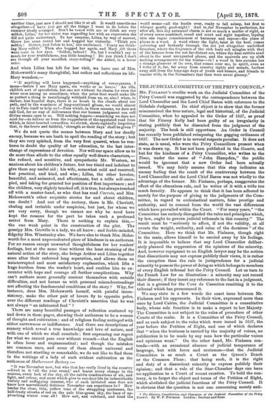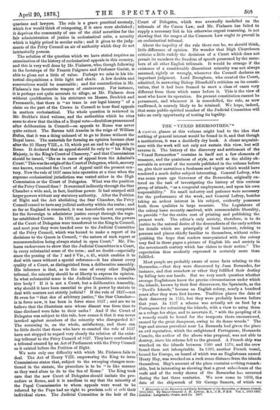THE JUDICIAL COMMITTEE OF THE PRIVY COUNCIL.*
Mn. FINLASON'S erudite work on the Judicial Committee of the Privy Council was suggested by the correspondence between the Lord Chancellor and the Lord Chief Baron with reference to the Ridsdale Judgment. Its chief object is to show that the former misconceived the true nature, legal and historical, of the Judicial Committee, when he appealed to the Order of 1627, as proof that Sir Fitzroy Kelly had been guilty of an irregularity in stating publicly that he dissented from the judgment of the majority. The book is still opportune. An Order in Council has recently been published reimposing the gagging ordinance of 1627. The new Order is in several respects peculiar. It does not state, as is usual, who were the Privy Councillors present when it was drawn up. It has not been published in the Gazette, and but for the kindness of a Privy Councillor, who writes to the limes, under the name of "John Hampden," the public would be ignorant that a new Order had been actually issued. We may fairly assume that this step indicates an uneasy feeling that the result of the controversy between the Lord Chancellor and the Lord Chief Baron was not wholly to the advantage of the former. Mr. Finlason, perhaps, exaggerates the effect of the obnoxious rule, and he writes of it with a trifle too much ferocity. He appears to think that it has been adhered to merely for the purpose of giving to the judgments of the Com- mittee, in regard to ecclesiastical matters, false prestige and authority, and to conceal from the world the vast differences which have prevailed within the Court. "For many years," "the Committee has entirely disregarded the rules and principles which, by law, ought to govern judicial tribunals in this country." The result must be "seriously to affect, if not the validity, at all events the weight, authority, and value of the decisions" of the Committee. Here we think that Mr. Finlason, though right in the main, allows himself to be carried away by his feelings. It is impossible to believe that any Lord Chancellor deliber- ately planned the suppression of the opinions of the minority. And, however repugnant to an English lawyer may be the notion that dissentients may not express publicly their views, it is rather the exception than the rule in jurisprudence for a judicial minority to possess the power of doing so which belongs to members of every English tribunal but the Privy Council. Let us turn to the French Law for an illustration : a minority may not record their dissent; if they insert any reference to the fact in a judgment, that is a ground for the Cour de Cessation remitting it to the tribunal which has pronounced it.
We may state in a few words the exact issue between Mr. Finlason and his opponents. In their view, expressed more than once by Lord Cairns, the Judicial Committee is a consultative body, whose sole function is to make a report to her Majesty. The Committee is not subject to the rules of procedure of other Courts of the realm. It is a Committee of the Privy Council, and as such subject to the rules which were issued in 1627, the year before the Petition of Right, and one of which declares that "when the business is carried by the majority of voices, no publication is to be made by any man how the particular veices and opinions went." On the other hand, Mr. Finlason con- tends—with an occasional absence of judicial temperance of language, but with force and acuteness—that the Judicial Committee is as much a Court as the Queen's Bench or the Common Pleas ; that being such, it is the right and duty of a dissentient minority to express publicly their opinion ; and that a rule of the Star-Chamber days can have no application to a Court of recent creation. To hold the con- trary, is to forget the object and terms of the Petition of Right, which abolished the judicial functions of the Privy Council. It is obvious that the question is not one concerning merely anti-
* The History. Constitution, and Character of the Judicial Committee of the Privy Council. By W. F. Finlason. London : Stevens and Sons.
quarians and lawyers. The rule is a grave practical anomaly, which few would think of reimposing, if it once were abolished ; it deprives the community of one of the chief securities for the fair administration of justice in ecclesiastical suits, a security which is highly prized in secular suits ; and it gives to the judg- ments of the Privy Council an air of authority which they do not intrinsically possess.
The solution of the question which we have stated requires an examination of the history of ecclesiastical appeals in this country, and this is very well done by Mr. Finlason, who, though following in the footsteps of Sir Francis Palgrave and Professor Gneist, is able to glean not a little of value. Perhaps we miss in his his- torical disquisitions a little light and shade. A few doubts and reservations would be seasonable; and flat contradiction is Mr. Finlason's too favourite weapon of controversy. For instance, it is perhaps not quite accurate to allege, as Mr. Finlason does without qualification in his strictures on Messrs. Brodrick and Freemantle, that there is "no trace in our legal history" of a claim on the part of the Crown in Council to hear final appeals in matters ecclesiastical. The whole question is reviewed in Mr. Stubbs's third volume, and the authorities which he cites seem to show that the idea of a Royal veto—doubtless pronounced after deliberation in Council—on appeals to Rome was never quite extinct. The Barons told Anselm in the reign of William Rufus, that it was a thing unheard of to go to Rome without the Royal leave. The materials for forming an opinion become clear after the 25 Henry VIII., c. 19, which put an end to all appeals to Rome. It declared that an appeal should lie only to "his King's Majesty, in the King's Court of Chancery," and that Commissions should be issued, "like as in cases of appeal from the Admiral's Court." This was the origin of the Court of Delegates, which, as every one knows, remained the Court of Appeal until the present cen- tmy. Now the rule of 1627 came into operation at a time when the supreme ecclesiastical jurisdiction was vested either in the High Commission or the Court of Delegates. What was the position of the Privy Council then ? It exercised indirectly through the Star Chamber a wide and, in fact, limitless power. It had usurped still larger powers without any statutory authority. After the Petition of Right and the Act abolishing the Star Chamber, the Privy Council ceased to have any judicial authority within the realm ; and so far as England is concerned, it was henceforth not competent for the Sovereign to administer justice except through the regu- lar established Courts. In 1832, as every one knows, the powers of the Court of Delegates were transferred to the King in Council, and next year they were handed over to the Judicial Committee of the Privy Council, which was bound to make a report of its decisions to the Queen in Council, "the nature of such report or recommendation being always stated in open Court." Mr. Fin- Jason endeavours to show that the Judicial Committee is a Court, in every substantial sense of the term ; and no doubt—especially since the passing of the 7 and 8 Vic., c. 61, which enables it to deal with cases without a special reference—it has almost every quality of a Court, as distinguished from a deliberative assembly. His inference is that, as in the case of every other English tribunal, the minority should be at liberty to express its opinion. In what substantial sense is the Judicial Committee a consulta- tive body ? If it is not a Court, but a deliberative Assembly, why should it have been essential to give it power by statute to deal with matters not strictly judicial? If the rule of 1627—not fit even for "that den of arbitrary justice," the Star Chamber— is in force now, it has been in force since 1627; and are we to believe that the illustrious men whose dissent was from time to time disclosed were false to their oaths ? And if the Court of Delegates was subject to this rule, how comes it that it was never invoked against members of the minority who disregarded it? The reasoning is, on the whole, satisfactory, and there can be little doubt that those who have re-enacted the rule of 1627 have not stopped to regard very closely the relation of the exist- ing tribunal to the Privy Council of 1627. They have confounded a tribunal created by an Act of Parliament with the Privy Council as it existed before the Petition of Right.
We note only one difficulty with which Mr. Finlason fails to deal. The Act of Henry VIII. empowering the King to issue Commissions states that, subject to the sweeping changes men- tioned in the statute, the procedure is to be "in like manner as they used afore to do to the See of Rome." The King took care that the new Court of Delegates should imitate the pro- cedure at Rome, and it is needless to say that the minority of the Papal Commissaries to whom appeals were wont to be referred by the Pope had no right to proclaim urbi et orbi their individual views. The Judicial Committee is the heir of the Court of Delegates, which was avowedly modelled on the tribunals of the Canon Law, and Mr. Finlason has failed to supply a necessary link in his otherwise cogent reasoning, in not showing that the usages of the Common Law ought to prevail in an ecclesiastical tribunal.
About the impolicy of the rule there can be, we should think, little difference of opinion. No wonder that High Churchmen criticise a little rudely the decisions of a Court which does not permit its members the freedom of speech possessed by the mem- bers of all other English tribunals. It would be strange if the existence of a considerable dissentient minority was not always assumed, rightly or wrongly, whenever the Council declares an important judgment. Lord Brougham, who created the Court, admitted, in answering Bishop Blomfield's criticism on its consti- tution, that it had been framed to meet a class of cases very different from those which came before it. This is the view of most who know its operation. Its present constitution cannot be permanent, and whenever it is remodelled, the rule, as now reaffirmed, is scarcely likely to be retained. We hope, indeed, that some public-spirited member of the Judicial Committee will take an early opportunity of testing its legality.



































 Previous page
Previous page